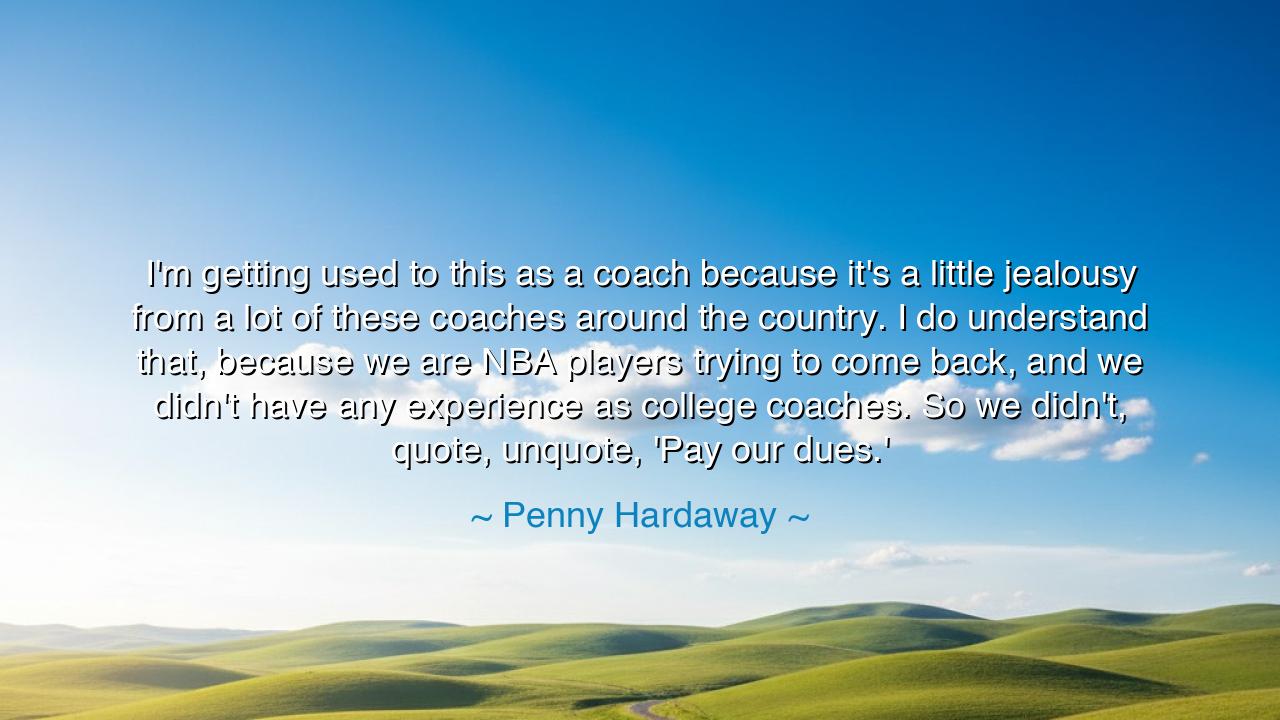
I'm getting used to this as a coach because it's a little
I'm getting used to this as a coach because it's a little jealousy from a lot of these coaches around the country. I do understand that, because we are NBA players trying to come back, and we didn't have any experience as college coaches. So we didn't, quote, unquote, 'Pay our dues.'






In the wise and candid words of Penny Hardaway, “I'm getting used to this as a coach because it's a little jealousy from a lot of these coaches around the country. I do understand that, because we are NBA players trying to come back, and we didn't have any experience as college coaches. So we didn't, quote, unquote, ‘Pay our dues.’” These words are not merely the reflection of a man defending himself from criticism; they are the confession of a soul that has learned the price of success. For wherever there is achievement, there will also be jealousy, and wherever one rises swiftly, others will question the height of his ascent. Yet Hardaway’s words are not bitter. They speak with understanding — the wisdom of a man who sees beyond envy into the frailty of human pride.
The origin of this quote comes from Hardaway’s journey from being a celebrated NBA player to becoming a college basketball coach. He entered a world governed not by athletic glory but by politics, hierarchy, and tradition — a world where coaches were expected to “pay their dues,” climbing slowly through assistant roles and years of unseen labor. Hardaway, blessed with fame and credibility from his professional years, stepped directly into a position of leadership. To some, this seemed unfair. To others, it seemed threatening. Thus arose the jealousy he speaks of — the quiet resentment of those who felt that greatness should be earned only through their own familiar path. But Hardaway, with humility, acknowledges their feeling while refusing to apologize for his purpose.
His reflection captures a timeless truth: that jealousy is often the shadow cast by another’s light. It is not born from hatred, but from comparison — from the painful awareness that someone has achieved what we, too, desire. Hardaway does not condemn his critics; he understands them. He knows that many of them, having spent their lives striving for recognition, feel overlooked when a man like him — a former NBA star — steps into their world. Yet he also knows that experience wears many forms. His years as a player, battling through hardship, leadership, and competition, were themselves a different kind of apprenticeship — one of sweat, pressure, and perseverance.
The ancients knew well the sting of envy between those who rise by different paths. Consider the story of Julius Caesar and Cato the Younger, two men of Rome’s senate. Caesar, ambitious and charismatic, soared quickly to power, beloved by the people; Cato, austere and disciplined, believed Caesar’s success was undeserved, that he had not “paid his dues” in the moral sense. Their rivalry was not of hatred alone, but of jealousy born from differing visions of honor. Cato could not see that Caesar’s gifts were his own kind of preparation, just as Caesar could not see the virtue in Cato’s restraint. In the end, both men fell — victims not of war, but of envy’s unrelenting fire. So too does Hardaway’s experience remind us: jealousy, when left unchecked, destroys both the envious and the envied.
But what makes Hardaway’s insight profound is his understanding — his refusal to let resentment breed resentment. Instead of anger, he chooses empathy. He sees that jealousy is natural, even expected, when change comes swiftly. And in doing so, he rises above it. For the wise man knows that every accusation can be turned into an opportunity — to prove not one’s worth, but one’s integrity. The jealous may question your path, but only your perseverance can silence them. This is Hardaway’s lesson to all who walk into a world that doubts them: let your work speak, and your humility disarm.
In every generation, there are those who rise in ways others cannot understand. The innovator who challenges old methods, the young leader who surpasses his mentors, the visionary who skips the steps others climb — all will meet the same trial. The world will ask, “Have you paid your dues?” But dues are not measured in time alone; they are measured in purpose, pain, and passion. The soldier who has endured battle need not apologize to the scholar for not studying war in books. Each earns wisdom in his own way. The true question, then, is not how long one has worked, but how deeply one has learned.
The lesson, dear listener, is both timeless and liberating: do not fear jealousy, nor seek to erase it. For as Hardaway teaches, it is the echo of your progress — proof that you are moving where others dare not tread. Yet do not let it harden your heart. Meet envy with grace, not pride; respond with excellence, not anger. Remember that the wise see jealousy not as an insult, but as a test of patience and focus. Keep walking your path, for the noise of envy fades before the sound of accomplishment.
So let the words of Penny Hardaway stand as a shield for all who pursue their calling against the current of doubt: “We didn’t, quote, unquote, ‘Pay our dues.’” To this, the heart of the brave replies — our dues are paid in struggle, in faith, in perseverance. The world may not understand your journey, but it is not for the world to walk it. Stand firm, be humble, and let your light speak for itself. For those who act with purpose need not explain their rise; time will crown them with understanding, and envy will fade into silence before the enduring truth of their work.






AAdministratorAdministrator
Welcome, honored guests. Please leave a comment, we will respond soon